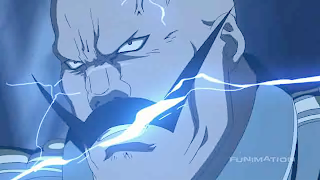Ani-Gamers staff writer Ink contributes a weekly column in which he examines the difference between the original Fullmetal Alchemist and its re-telling, Fullmetal Alchemist: Brotherhood. (As of this Sunday, we will be caught up with the latest episode in the FUNimation release.) To read previous entries, click here.
Watch Episode 4 – An Alchemist’s Anguish
This is another episode that packs a couple of FMA1 story arcs into a single installment. Skipping a bit ahead of FMA1, we’re treated to the introduction of Basque Grand (The Iron Blood Alchemist) and his death via Scar via a rather impressive show of alchemic talent that was sadly little more than alluded to in FMA1. Again, this shows FMA2’s commitment to action sequences and exposing state alchemists’ abilities.
My favourite worm from FMA1, Lieutenant Yoki, also gets an early introduction. Paperwork being passed about in a room between Hawkeye’s crew and one line of dialog explains the whole of the FMA1 episode involved in his story. Although that particular episode was just a is-it-a-Philosopher’s-Stone quest, it served to set up an ultimate betrayal in FMA1, so it will be interesting to see how FMA2 uses him, if at all, or if they’re just keeping FMA1 fans like me happy by alluding to him.
The meat of this episode focuses on Shou Tucker (The Sewing Life Alchemist), who is directly recommended and introduced by Mustang as a tutor to the Elrics. This immediately lessens the manipulative implications of Roy’s FMA1 persona. Another difference is that the brothers don’t live at Tucker’s place as in FMA1, just going there to study (and play with Nina/Alexander) instead. This puts less believable emphasis for Ed’s distress over Tucker’s later action. Also, having Ed and Al at Shou’s after their exams puts less emphasis on learning to become State Alchemists and, in my opinion, rightly highlights their desire to perform human transmutation.
Continuing its tendency to tell-not-show important character development, FMA2 has Tucker explain the assessment process to his daughter instead. Thus the gravity of Shou’s motive doesn’t come as a dark epiphany to Ed but as a babble directly from Shou after his ill-fated work is completed. On the contrary, there is a very quick, but very effective flashback to the Elric’s estrangement from their father because of his obsession with alchemy, forming a closer identification with Nina.
Speaking of the ill-fated act, Ed’s discovery of Tucker’s Chimera’s components, the bludgeoning is more graphic and intense, with Ed losing control of himself during the beating. More importantly, the Chimera asks “does it hurt” of Tucker instead of FMA1’s “Edward, why does it hurt?” The ramifications are great, as this little line of dialog sways sympathy to Tucker’s side (via his daughter’s concern for him) instead of promoting the sense of pain and betrayal felt by the Chimera. This, together with Mustang’s darker and more matter-of-fact assessment of the situation, does lend a bit of a more real-world feel to the series that stresses the emphasis of an uncaring world as opposed to FMA1’s internal personalization of the same. Which is more effective? I’m not actually sure, which is a compliment to FMA2.
Lastly, but not at all what anyone should consider least, Scar kills Tucker(!) in a military safe-house. Needless to say Shou’s role in FMA2 will not be a repeat of FMA1…unless he comes back as a zombie (sorry, homunculus). Tucker is killed in front of his Chimera, which repeatedly and lovingly calls him “daddy.”

